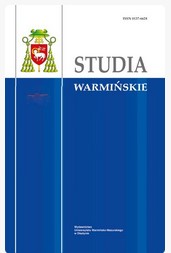Nazwiska niemieckie na literę F w księdze chrztów z Reszla z lat 1579–1653
German Names Starting with Letter F in the Babtismal Register of Reszel from the Years 1579–1653
Author(s): Marzena GuzSubject(s): Historical Linguistics, Descriptive linguistics, 16th Century, 17th Century
Published by: Wydawnictwo Uniwersytetu Warmińsko-Mazurskiego w Olsztynie
Keywords: surnames; etymology of surnames; variants of surnames; Warmia; Reszel; 16th and 17th centuries;
Summary/Abstract: This paper analyses the origin of genetically German surnames, to esta¬blish their structure (if they are derived names, using the structural method), to indi¬cate whether they have variants in 16th and 17th centuries, what their origin was and whether the surnames under investigation were still recorded in Warmia in the 18th century and in the 20th century in the former Olsztyn Province. With regard to the origin of surnames, the classification of surnames with a single motivation is partly based on S. Rospond (1967: XXVI–XXVIII) but has been significantly modified. The subclassification principle is, as in S. Rospond, based on the lexical-derivative (semantic-motivational) criterion. In addition, the etymology-related classification of surnames was followed, among others, according to the “Duden. Familiennamen” dictionary. Most of the names described here are non-derivative. Other names are derived with the use of German suffixes: -er, -l, -ler, -mann, -ner, a Latin suffix -ius and paradigmatically with a formant -en. A few surnames appear in the form of abbreviated first names and/or their diminutive forms. Most of the names are names with a single motivation. They are mainly derived from place names, from names of professions, first names and nicknames. Ten surnames demonstrate two and more motivations. Only a few surnames have their variants. The reasons for the occurrence of surname variants in the examined material include Polonisation, Latinisation, doubling of consonants without justification, remnants of spelling rules in Early New High German, and the fact that the given surname originated in Middle Low German. Eighteen surnames had ceased to exist by the 18th and 20th centuries, i.e. about two-thirds of the examined material.
Journal: Studia Warmińskie
- Issue Year: 59/2022
- Issue No: 59
- Page Range: 391-402
- Page Count: 12
- Language: Polish

